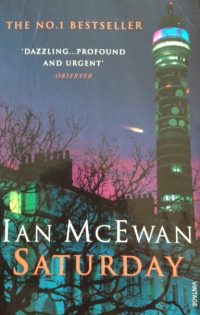
February’s Walking Book Club choice – Saturday by Ian McEwan – is another suggestion from that smart husband of mine. Like all Walking Book Club choices, Saturday is a novel about neuroscience – in this case, the protagonist is a neurosurgeon.
A summary from author Ian McEwan’s website:
Saturday is a novel set within a single day — 15 February 2003. Henry Perowne is a contented man – a successful neurosurgeon, happily married to a newspaper lawyer, and enjoying good relations with his children, who are young adults. What troubles him is the state of the world – the impending war against Iraq, and a general darkening and gathering pessimism since the New York and Washington attacks two years before.
On this particular Saturday morning, Perowne makes his way to his usual squash game with his anaesthetist, trying to avoid the hundreds of thousand of marchers filling the streets of London, protesting against the war. A minor accident in his car brings him into a confrontation with a small-time thug called Baxter. To Perowne’s professional eye, something appears to be profoundly wrong with this young man. Baxter, in his turn, believes the surgeon has humiliated him, and visits the opulent Perowne home that evening, during a family reunion – with savage consequences that will lead Henry Perowne to deploy all his skills to keep this doomed figure alive.
The first chapter of Saturday includes a six-page description of neurosurgery, so detailed it has been likened to ‘med-porn’:
He clipped the neck of a middle cerebral artery aneurysm—he’s something of a master in the art—and performed a biopsy for a tumour in the thalamus, a region where it’s not possible to operate
The accolades and criticisms of this novel are numerous (I sit firmly in the 5-star camp). A list of reviews can be read on McEwan’s website.
What happens after I read the book?
In about two weeks time I’ll send out my newsletter with questions for you and your friends to discuss while you walk (and I’ll also put the questions here on the blog). If you haven’t already signed up for the Your Brain Health newsletter you can sign up here.
Please don’t stress too much if you don’t get to read all of the book. For a start, stress is bad for your brain health (you know that now, right?), and the questions will be designed to spark discussion about broader issues raised in the book, not a page-by-page analysis!!
If you need a reminder of the philosophy behind The Walking Book Club you can read more here….
Walking Book Club Discussion
- Why does Henry fall so completely for Rosalind? Is it her vulnerability that appeals to him, or is it literally love at first sight? What are your thoughts or experiences with love at first sight?
- Seeing the burning plane has a big impact on Henry. Discuss your feelings about the early 2000s when everyone was on edge after 9/11 twin towers and later after the London bombings? Did it change the you reacted to perceived threats?
- When Henry returns to the hospital that night, he realises this is where he feels most comfortable. Is there a place where you personally feel most comfortable? Why does it make you feel that way?
- What saves Henry’s family from Baxter and his cohorts: Poetry? Pregnancy? Bravery? Intelligence? Luck? Divine intervention? Baxter’s illness? How would you have reacted in a similar situation?
- During Henry’s reunion with Daisy, they waver between words of affection and a rapid-fire ideological debate about Iraq. How would such a debate have unfolded in your household?
- As Henry watches his mother’s dementia worsen, he labels the physiological reasons for her decline. Do you think his familiarity with neurology and the brain makes it easier or harder for him to come to terms with losing her?
- The title of the novel ‘Saturday’ is thought to be somewhat ironic. Henry intended to spend the day relaxing – does the modern world allow for any true respite from worry?
With thanks to Benny’s Book Club and Lit Lovers for the inspiration for these questions.
Share the love
[Sassy_Social_Share]
About Dr Sarah
Neuroscientist, Author, Speaker, Director of The Neuroscience Academy suite of professional training programs.
Latest Posts
Free 10 day micro-training in neuroscience

Learn one neuroscience concept a day!
10 simple, bite-sized lessons in brain health, delivered daily to your inbox

